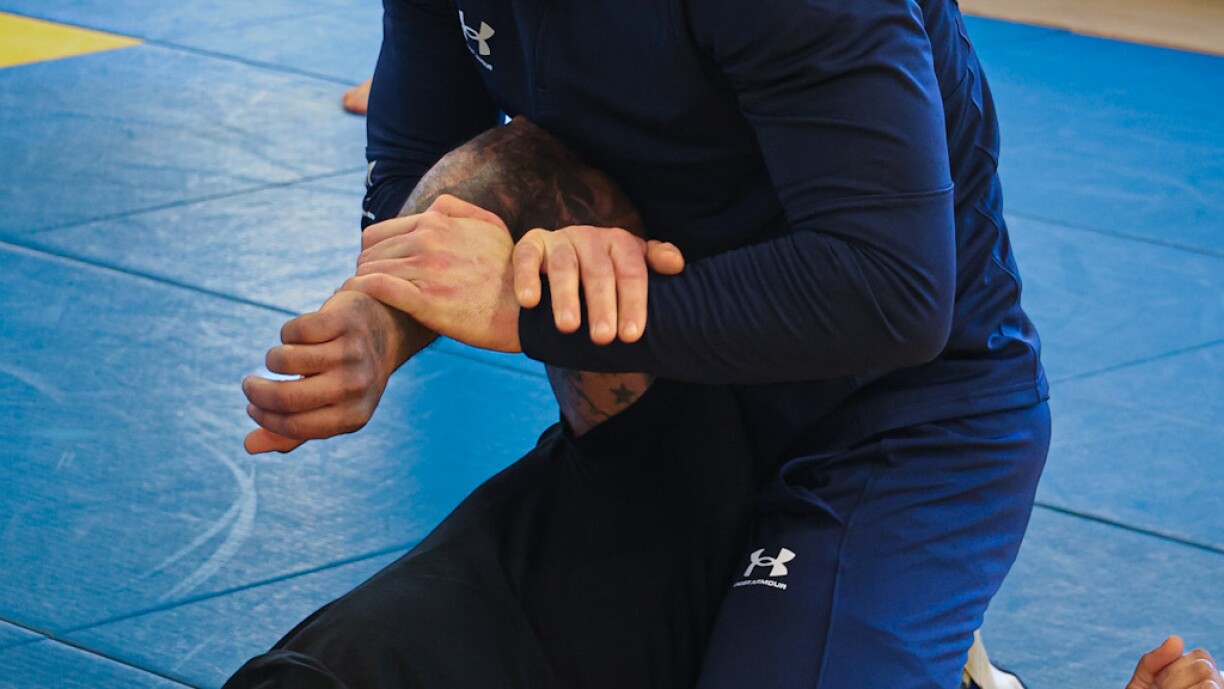
On a Saturday morning, at the police centre Dojo in Bonnnevoie, around 15 to 20 professionals gathered to learn valuable skills for their respective jobs. The participants work in fields where conflict management and aggression are common, such as social work, law enforcement, and security. All being bound by a strict and limited legal framework, safely managing aggression is essential.
The founder of Fit2Elevate Combatives is Edoardo Angioni, a recently crowned bronze medalist at the European IBJJF Jiu-Jitsu Championships. He has years of experience working as a social educator at institutions such as Dreiborn, the juvenile detention centre in Luxembourg, and Aitia, the state institute for child and youth assistance. Also leading the session were three other experienced professionals with similar martial arts experience: Eugenia Angioni (psychotherapist), Jimmy Lima (detention officer), Yago Garcia (social worker), and special guest Gil Mathes (high-ranking police officer and Brazilian Jiu-Jitsu coach).
The goal was to teach safe and professional containment techniques that neutralise a threat without causing harm. It was made clear from the very beginning that this form of combat should only be used in dangerous situations, but verbal communication should be the first point of call when attempting to diffuse the situation.
Through demonstrative and collaborative work, a wide range of debilitating but painless techniques, primarily from Brazilian Jiu-Jitsu, were performed in order to enact a safe way of immobilising a potential threat. Key movements were highlighted to enable a professional to neither harm themselves nor the threat, including correct head positioning, arm movement, and an array of holds.
A police officer who has worked in Luxembourg City since 2017, and wished to remain unnamed, shared his perspective. “Some of the techniques are used on a near-daily basis in police work, especially in my station. I’m subjected to dangerous situations regularly, as people choose to resist arrest and you need to be able to immobilise them without hurting the individual. There are always cameras on us and people from the outside like to talk badly, so in the instance where an arrest is filmed, we know that we can use the correct techniques to immobilise someone without injuring them.”
When questioned on the increasing crime in the Gare area, he highlighted that he has noticed a stark increase in physical violence mainly due to drug consumption but feels that initiatives like this one can fill police officers with confidence to perform the correct decisions “if they are 100kg or 50kg, you know what you can do and are always ready for what is in front of you”. Emphasising that “crime is not on the decline”.
Eugenia, one of the instructors and a psychotherapist, stated it was not just the skills that she had learnt through the art of containment that she finds useful but also the confidence she has gained. “Since I started working my body, in a way that I now own this. I have had less issues at work, less issues on the street, because people can feel, in the way that I carry myself: ‘this woman knows’.”
Eugenia went on to add how the tools she has learnt have been beneficial in her professional environment, she works a lot with victims of violence including with children. “Sometimes, we need to make sure that we can contain kids in a safe way. Occasionally, they are in so much distress that they will get aggressive and that’s what we learn here.”
In light of the ongoing situation in the City, particularly in the Gare area, professionals are increasingly confronted with challenging and sometimes dangerous situations. Initiatives like this training session are crucial in providing them with the necessary skills to de-escalate conflicts and ensure public safety within a legal framework.